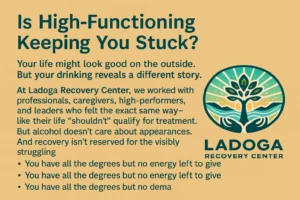You’ve got the degrees. The calendar full of meetings. The paycheck that covers more than the basics. People trust you. Some admire you. Some envy you.
And maybe you even believe it when you say, “I’m fine.”
But there’s a different truth that only shows up after 9pm. Or on weekends when no one’s watching. Or in the early hours of the morning when the headache isn’t just from the wine, and your memory has a few soft gaps that scare you more than you’ll admit.
Your life looks polished.
But your drinking tells a different story.
At Ladoga Recovery Center, we’ve worked with professionals, caregivers, high-performers, and leaders who felt the exact same way—like their life “shouldn’t” qualify for treatment. But alcohol doesn’t care about appearances. And recovery isn’t reserved for the visibly struggling.
High-Functioning Doesn’t Mean Low-Risk
Let’s name it: “functioning alcoholic” is a misleading label.
Because here’s what it often means in real life:
- You don’t drink in the morning (yet).
- You show up to work (but hangovers are getting worse).
- You limit your drinks in public (but binge when you’re home alone).
- You only drink wine or beer (but several glasses or cans, every night).
- You’ve never gotten a DUI (but you’ve driven buzzed more times than you’d like to admit).
These patterns feel manageable—until they’re not.
Just because you’re not falling apart doesn’t mean alcohol isn’t quietly changing your brain, your body, your relationships, and your sense of self.
The Drinking Becomes the Day’s Quiet Center
You don’t plan your whole life around alcohol.
Just the evenings.
And the weekends.
And holidays.
And maybe stressful days.
And the celebrations.
And the boring days.
And the nights you need sleep.
And the ones where you can’t feel anything.
It starts as a reward. Then a relief. Then a requirement.
Before you know it, alcohol becomes the axis around which your life rotates—even if no one sees it but you.
You’re Not “Too Smart” for This
One of the cruelest thoughts we hear from clients is:
“I’m smarter than this. I should have more control.”
Let us be clear: addiction doesn’t happen because of stupidity. It happens because your nervous system is overloaded, your coping skills have limits, and your brain has slowly rewired itself to believe that alcohol is the answer.
High-functioning people often stay in addiction longer because they’re so good at compensating. They know how to hide the cracks. Mask the fog. Perform even when they feel like collapsing.
But eventually, that performance eats away at you.
And you realize: being “the strong one” doesn’t protect you from pain.

Emotional Erosion Doesn’t Show Up in Blood Tests
We often think of addiction in physical terms—liver damage, blackouts, withdrawals. But long before the body gives out, the emotions start slipping.
What we hear from high-functioning drinkers is this:
- “I don’t feel anything anymore—except when I drink.”
- “I don’t enjoy people the same way.”
- “I’m exhausted by how much pretending I do.”
- “I’m scared to stop because I don’t know what would be left of me.”
These are not “soft” symptoms. They are serious. And they are treatable.
You don’t need to wait for a medical emergency to get help.
The emotional exhaustion is reason enough.
What You’re Doing Works—Until It Doesn’t
You’ve likely created a set of rules around your drinking.
Only after 5.
Only wine.
Never at work events.
Never before the kids go to bed.
These rules give the illusion of control. Until they start bending:
- 5 becomes 4:30.
- A “few glasses” becomes a bottle.
- The line between “I want this” and “I need this” blurs.
The scariest part?
You can still function.
But you don’t feel like you anymore.
That’s when people call us. And we always say the same thing:
You don’t have to wait for your life to break to decide you’re done breaking inside.
What Alcohol Addiction Treatment Really Looks Like
Many high-functioning clients resist treatment because they picture something dramatic—a total life upheaval.
But treatment can (and should) match your needs and your life.
At Ladoga Recovery Center, we offer levels of care that include:
- Intensive Outpatient Programs (IOP) that allow you to work or manage home life while receiving clinical support
- Outpatient therapy focused on the emotional roots of your drinking—not just behavior management
- Medication-assisted treatment (MAT) when appropriate to reduce cravings and stabilize mood
- Confidential, compassionate care with professionals who understand discretion matters
And no, you don’t have to tell everyone you’re “in rehab.”
You just have to tell yourself: I want something better.
Recovery Doesn’t Make You Weak. It Makes You Honest.
Treatment isn’t about confessing to a failure.
It’s about coming home to truth.
The truth that you’ve carried this long enough.
The truth that your drinking doesn’t define your worth.
The truth that you don’t have to keep pretending you’re okay.
Honesty, in recovery, is not dramatic. It’s often whispered.
It sounds like:
- “This is too much.”
- “I’m tired.”
- “I’m scared I can’t stop.”
- “I think I need help.”
And when we hear that?
We don’t judge.
We nod.
We make space.
FAQ: Alcohol Addiction Treatment for High-Functioning Adults
I don’t drink every day—can I still need treatment?
Absolutely. It’s not just about frequency—it’s about function. If your drinking is negatively impacting your mental clarity, relationships, sleep, or emotions, it’s valid to seek support.
What if I’ve never blacked out or been in trouble?
You’re not alone. Many people who come to us are still “functional” by external standards. But internally, they’re exhausted and ready for change. That’s reason enough.
Will I lose my job if I go to treatment?
Many clients choose IOP or evening outpatient to stay engaged with work. Our programs are discreet and customizable. We can work with you to protect your privacy and schedule.
Is outpatient treatment enough?
It can be, depending on your needs. Some high-functioning clients thrive in outpatient with strong clinical support. Others benefit from a more structured level of care for a short time before stepping down.
What if I’m not sure I’m ready to quit completely?
You’re allowed to explore that. Treatment isn’t about forcing absolutes—it’s about learning what’s underneath your drinking and building the life you actually want. Many people begin unsure and gain clarity as they go.
If You’re Questioning Your Drinking—That’s Your Sign
People don’t wonder if they need help for no reason.
If you’re Googling this.
If you’ve deleted and re-typed the phrase “alcohol addiction treatment in Indiana.”
If you’ve read blogs like this before and thought, maybe later…
Then your inner self is trying to break through the performance.
And it deserves to be heard.
At Ladoga Recovery Center, we won’t ask you to prove anything. We’ll just meet you where you are—with honesty, with expertise, and with options that respect your life and your desire to live it fully again.
Call (888) 628-6202 or visit our Alcohol Addiction Treatment page to learn how we can help you reclaim peace—quietly, privately, and powerfully.

